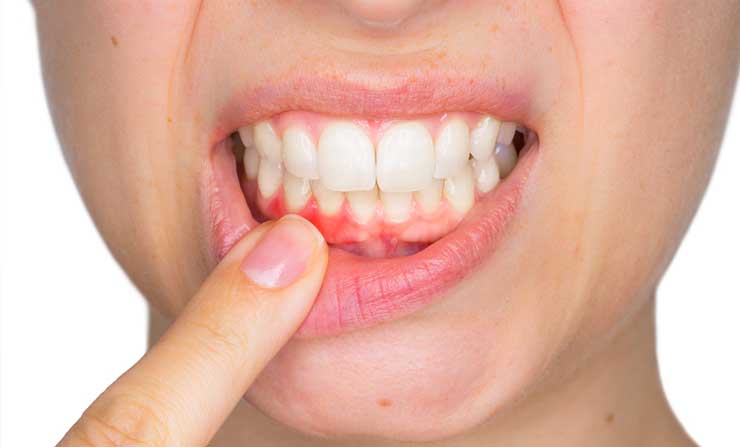Gingivitis is the early stage of periodontal disease and involves an inflammation of the gums. Our mouths are full of bacteria which appear as a clear, sticky substance known as plaque that builds up on your teeth daily. Plaque can harden over time if it is not removed by daily brushing and flossing. When it hardens it is called tartar and becomes so strongly attached to the tooth that it can then only be cleaned by a dental professional.
Tartar can cause an infection, known as gingivitis, at the point where the gums attach to the teeth. Gingivitis often develops slowly and painlessly and the only symptoms are gums that are slightly red and bleed when you brush. At this stage periodontal disease is hard to detect but easy to treat, so regular dental checkups and dental hygiene visits are critical.
If gingivitis is left untreated, it can advance to periodontitis in NE Calgary. When plaque spreads below the gum line, the gums pull away from the teeth, forming pockets that become infected. As the body’s natural immune system fights the bacterial toxins, the bone and connective tissues that hold the teeth in place are broken down. At this point, you may notice swelling, bleeding, color change in the gums, and loosening of teeth that can eventually lead to tooth loss.
Calgary Periodontal disease is generally painless and hard to detect in its early stages, which is why it’s so important to make regular checkups with your Memorial Square Dental Clinic dentist and hygiene visits with our Hygienists.
Our Calgary dentists may use probes and X-rays to check for pockets and bone loss and may refer you to a periodontist ‘– a specialist in gum disease. There are, however, some symptoms which can help detect possible infection:
- Bleeding gums
- Red, shiny, and swollen gums
- Persistent bad bread or bad taste
- Pus around the teeth and gums
- Receding gums
- Tenderness, discomfort, and sensitivity
- Painful chewing
- A taste of metal in your mouth
- Loose teeth
- Changes in the alignment of your teeth
While periodontal diseases are usually caused by poor oral hygiene, other factors can contribute to the risk of infection:
- Smoking
- Diabetes
- Cancer
- HIV/AIDS
- Genetic predisposition
- Crooked teeth
- Hormonal changes in women can make gums more sensitive
- Medications that cause dry mouths
- Stress
- A poor diet
- Fillings or bridges that no longer fit properly
- Clenching and grinding teeth
- X-rays can also be taken to assess the level of bone around your teeth
In its early stages, Calgary periodontal disease is easy to treat. Good oral hygiene practices such as daily brushing and flossing, and regular dental checkups to remove tartar and detect diseases, can prevent or reverse gingivitis. Some risk factors can be reduced such as quitting smoking, improving diet, and using products that can stimulate or replace saliva. Speak with your Memorial Square Dental Clinic dentist at our Calgary dental clinic about ways to prevent periodontal disease in NE Calgary.
If the disease advances to its later stages it can be much more difficult to treat. Depending on the nature of the infection and the patient’s medical history, your dentist may recommend several methods of treatment. Scaling is a method of scraping tartar below and above the gum line, and root planning can be used to get rid of rough spots on the tooth root where bacteria gathers. Some medicines may be recommended to control bacteria or hold back the body’s immune response which can break down tissues.
Periodontal Care Near You
Finally, your Calgary dentist may suggest surgical treatment. Flap surgery involves pulling back the gums and removing tartar, then suturing the gums so they fit tightly with the teeth, getting rid of the pockets where bacteria build up. Bone and tissue grafts may be used to replace lost bone and tissue. Your Calgary dentist may also insert a small mesh between the bone and gum tissue to ensure that the bone and gums grow in their proper places. The exact surgery will depend on the scope of the disease and the patient’s medical history.
Research has found potential links between periodontal disease and health conditions like stroke, heart attacks, and increased risk during pregnancy. It’’s currently unknown whether periodontal diseases cause other health problems or if both are caused by the same underlying condition. Regardless, it is clear that, if you want to keep your teeth and minimize your risk of a variety of different problems, periodontal disease must be prevented, and it is relatively easy to do so.
We invite you to book an appointment at Memorial Square Dental Clinic in Calgary, NE, today. Our Calgary dental team of dentists and dental hygienists look forward to helping you and your family maintain your Calgary oral health and all of your family’s dental health needs.


